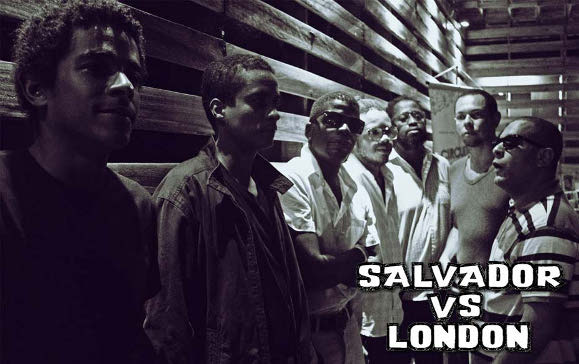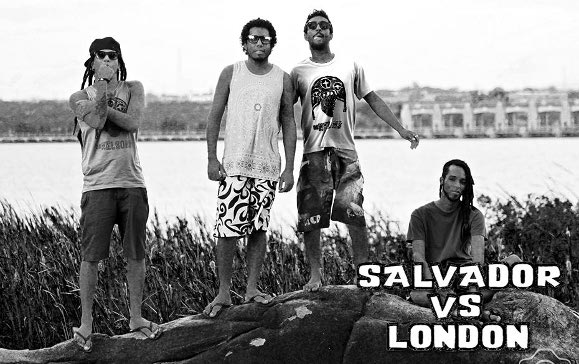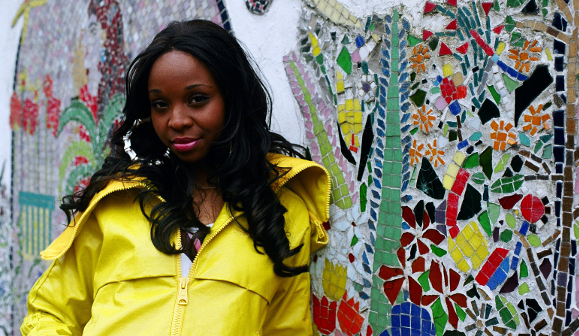Articles about reggae music, reviews, interviews, reports and more...
Bass Culture Clash: Salvador Vs London

Bass Culture Clash: Salvador Vs London
An enjoyable evening bringing a diverse range of acts together that would normally never share the same stage.
Bass Culture Clash: Salvador Vs London was an ambitious event resulting from a collaboration between British Underground, a music production outfit based in London, and Brazil Music Exchange, an agency in Sao Paolo devoted to stimulating cultural exchanges between Brazilian artistic practitioners and their counterparts in other lands. A bit of additional background: last year, British Underground unleashed the initial ‘Bass Culture’ concept via a panel discussion, also held at the Roundhouse, in which ‘Bass Culture’ was basically revealed as a shorthand for contemporary black music that draws on the techniques of Jamaica’s reggae and dub pioneers, as filtered through developments that have since come into play in the UK, such as ragga, jungle, drum and bass, grime, and dub-step, to name but a few. At that inaugural event, and at a subsequent debate held at south London’s Bussey Building, needless to say, there was a lot of contention about this use of the term, with most of the resistance coming from old-school reggae heads, who felt that a distinction should be made between the various reggae forms and any subsequent ‘urban’ mutations. In any case, under British Underground’s direction, a diverse group of ‘Bass Culture’ artists hit the 2012 South by Southwest festival in Texas to showcase the concept, including top-ranking veteran Jamaican singer Little Roy, rising sing-jay star Gappy Ranks, veteran British roots band the Rasites, Birmingham-based MC Lady Leshurr, and leading junglist, Kenny Ken.

Moving up to May 2013, we find some ‘Bass Culture’ artists from London widening their campaign trail to link with likeminded artists in Salvador, which forms the epicentre of black culture in Brazil, since it is the city with the largest population of African descendents in that massive, diverse nation. This time, London’s bashment-focussed Heatwave sound system, with MC Lady Chann, went down to Bahia with mellow singer-songwriter Natty, to perform with live rap group O Quadro and digital futurists Os Nelsons. Clips on the net show the performances in Bahia to have been taken in by an enthusiastic and appreciative crowd, though the scenes with the biggest response seemed reserved for the stars of Salvador.
I wasn’t quite sure what to expect at the Roundhouse gig, especially since the artists must have been on some extreme jet-lag, having only just returned from their Bahian sojourn. I reached the venue just as the show was starting—very early, at 7:30pm, on a Thursday night—found it was being held in the smaller downstairs venue at the Roundhouse, and things were not looking too busy when Os Nelsons hit the stage, though the show was officially sold out. Mid-way through their set, however, the venue was certainly packed.
Decked out in floppy leather hats adorned with flashing red LEDs and wraparound reflecting sunglasses, Os Nelsons looked like they’d fit in an episode of Futurama—decidedly wacky, and with a cut-and-paste, mix-and-blend sound that veered all over the map. The Afro-futurist nightmare style they conjured draws from African montage forms like kuduro (which itself morphs sokous samples into another dimension), underpinned by the local percussive styles that are prominent in the barren Sertao hinterland that is their home, adding a hefty dose of electro-pop, a dash of dancehall, and a bit of funk-rock, then meshing the whole thing into something distinctly other—a messy sound as baffling as it is mesmerising. The high energy of the lead singer and his right-hand-man bass player/backing vocalist was counterbalanced by an understated guitarist at stage left, and a dude at the back with a laptop, injecting all manner of effects. ‘Olhe O Fogo’ had a wonky cyber-bass supporting its raunchy digital dancehall/dubstep minimalism; the only words I caught were ‘shaky shaky boom boom,’ presumably an enticement to shake one’s rump. ‘Calor’ reminded of the kind of dancehall rhythm once constructed by Cordell ‘Scatta’ Burrell, and the reggae/‘Bass Culture’ element was heightened by an exclamation of ‘Fire-fire-fire-fire burn! Ganja-ganja-ganja-ganja man! (and perhaps the odd ‘bumbo clot’), making it a kind of mutant dancehall disco with a strange accent. In total contrast, ‘E so se Jogar’ used a garbled soukous/kuduro loop as the blasting-off point for a groovy dance-floor filler, the choruses of which were built around nonsense dance exhortations. Similarly, ‘Tsunami’ seemed to be another mutated dancehall rhythm with an electro-pop vocal line; can’t really tell you what the song is about though, as my Portuguese has never been strong, and the vocals too fast and muddy to make sense of. ‘So Da Ela’ was much in the same vein, with a kuduro guitar loop floating over a hefty dubstep bass warble as the singer dropped lines about swimming in the sea, and chocolate…or something like that. ‘Já Dizia Odara’ had the most obviously reggae-oriented rhythm behind it, though the vocals were spat out like a hip-hop track, and then some rock guitar riff kicked in, just in case we thought we knew where we were going, before the song shifted gears to become a fearsome fast-paced dubstep track. This number seemed to encapsulate everything about their mission, namely to confuse, outwit, and shock.

After the propulsive explosion of Os Nelsons’ postmodern musical apocalypse, the decidedly down-tempo, mellow grooves of acoustic troubadour Natty felt like a real deflation. It was hard not to question the wisdom of this peculiar running order; surely it would have made more sense to have Natty start things up, easing the audience into the proceedings, rather than shocking the hell out of everyone with Os Nelsons, followed by this hyper-mellow, ultra-easygoing dread? The ‘Bass Culture’ aspect was called into question by a friend, who noted that the lanky singer and his acoustic guitar were backed only by two Rasta drummers and a bearded white dude playing a battered electric guitar. Nevertheless, there’s a lot of good in what Natty puts forward, and his more recent material evidences some good growth and maturity. The singers says his style is somewhere between Damian Marley and Neil Young, and overall, his set reminded me of the styles of Abdel Wright and K-Os, who both made an impact in the USA a few years back; it is easy to understand how Natty bagged a contract with Atlantic, given this potential for broader commercial appeal. I’m sure the SXSW crowd must have embraced him last year, and it would be good to know what Salvador made of him.
For those unfamiliar with Natty, aka Alexander Modiano, he’s a north-London based singer-songwriter that was born in San Francisco to an Italian father and a mother from Southern Africa. As befitting the ‘Culture Clash’ subject, his material draws from various sources, with a reggae lilt behind the pop, rock, and hip-hop twinges. On the night at the Roundhouse, as he sang longingly of heart and soul in an acoustic fashion, a lot of people in the audience were chattering away, especially those young Brazilians at the front who had comes to see the new heroes of their land. They were tapping their toes, too, but it took a while for the crowd to warm to him. By the time he hit the pop-oriented ‘July’, they were more engaged; the spirited ‘Change’ was one of the more forceful tracks, and he caught everyone’s attention when one of his backing percussionists joined him for a lively toast at the end. With nowhere to hide in his honest, highly personal material, Natty’s approach and delivery are ultimately admirable.
Then came a total shift of scenery again as O Quadro took the stage. The group is led by a trio of rappers that come with a full live band behind them, including a right-hand-man bass player/backing vocalist, counterbalanced by an understated guitarist at stage left who also played keyboards, as well as drummer on a small kit in the corner, and a vibrant percussionist. My friend reckoned they were like a Brazilian version of Cypress Hill; maybe the Roots is a better reference point, but even that notion doesn’t really get close to O Quadro, since they inject elements of local forms like ijexá, as well as dub, in their sound. They opened with an agreeably creepy number called ‘Balancuquadro’—can’t tell you what the song is about but I really liked the sound. ‘Evolui (Bem Aventuras)’ had a real reggae tinge in the guitar line and ‘Seja Bem Vindo ao Meu Lar’ sounded more unclassified, while ‘Planeta Diario’ veered into spacey funk-rock, with strange call-and-response choruses between lyrics about hypocrisy, Africa, America, petrodollars, and…not sure what else, but we’re definitely in ‘conscious rap’ territory here. ‘Sapoca Uma de Cem’ had another strange sing-along and ‘Fogos de Artifício Para o Precipício à Vista’ was a little psychedelic, while ‘Ta Amarrado’ had a pleasing funk bass. By the time they reached closing rock jam ‘Valor de X2’, I was definitely a convert—they’ve got great energy, a unique style and I only wish I could understand the wisdom of their lyrics better.
For me, the subsequent entrance of Lady Chann and the Heatwave boys felt like a downgrade. This is not to diss either party—they are good at what they do, but what they do is clearly aimed at a young bashment audience, while this reviewer is an old-school reggae head raised on the classic vinyl sound systems like Jah Shaka, Jack Ruby and Fatman; bashment from a laptop ain’t gonna fire my engines. Anyway, with the ‘Church Heathen’ rhythm pulsing in the background, Chann ran all over the stage for her opening number, spitting out lyrics, but soon ran out of energy. The r-and-b styling of ‘Feel Calm’ formed the best opportunity for us to check out her skills as a sing-jay, forming a good contrast to the rest of the straight-up deejay tracks she hit us with. ‘Sticky Situation’ had a more spitfire delivery, atop subsonic bass, and soon found our gal leaping headlong into the crowd. A few more lyrics, a lot more sweat, and she was gone.

Dropping a dubplate mix of Bob Marley’s ‘One Love’ at that moment seemed like a wrong move to me, but the crowd didn’t have any problem with it. Then, Beenie Man’s ‘Who Am I’, followed by Mr Vegas’ ‘Traffic Blocking’ and ‘Heads High’…surely I was hearing things? On to more predictable club favourites like ‘Bam Bam’ and ‘Murder She Wrote’ from Chakademus & Pliers, and then Cham’s ‘Vitamin S’ followed by Beenie Man’s ‘Dick’…for me personally, the selection left me colder than cold, but the assembled crowd was clearly having fun with it. The evening finished with a blast from the man of the moment, namely Stylo G with ‘Call Me A Yardie’, before the lights came on and everyone made their way to the exit.
Even if the event didn’t really do what it said on the tin (as we say in England), and although more actual collaboration between the UK and Brazilian acts would have been welcome, this was an enjoyable evening bringing a diverse range of acts together that would normally never share the same stage. Hats off to British Underground for having the vision to come up with the concept and for seeing the project through to fruition.
Comments actually desactivated due to too much spams
Browse by categories
Recommended Articles
Latest articles
Recently addedView all
© 2007-2024 United Reggae. All Rights Reserved. Reproduction in whole or in part is prohibited. Read about copyright
Terms of use | About us | Contact us | Authors | Newsletter | A-Z















